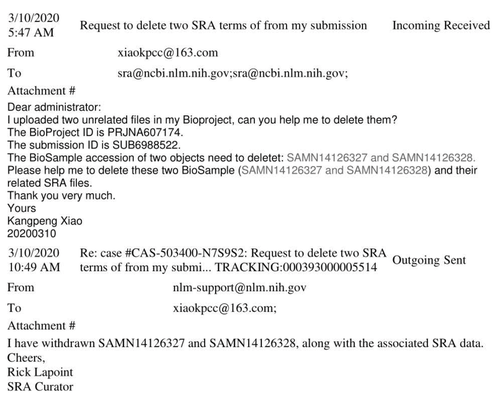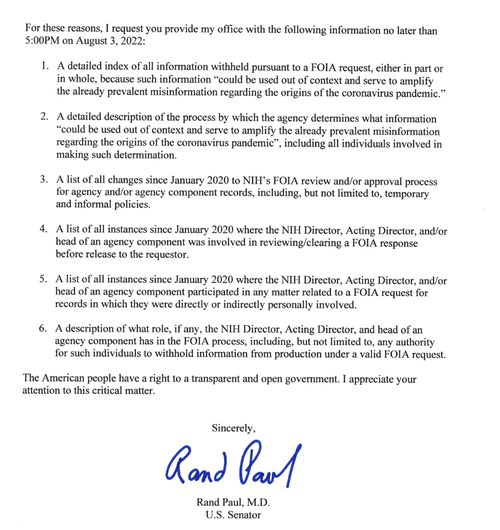Rand Paul Demands Answers After NIH Admits Redacting COVID-19 Origins Emails ‘To Prevent Misinformation’

All Global Research articles can be read in 51 languages by activating the “Translate Website” drop down menu on the top banner of our home page (Desktop version).
To receive Global Research’s Daily Newsletter (selected articles), click here.
Follow us on Instagram and Twitter and subscribe to our Telegram Channel. Feel free to repost and share widely Global Research articles.
***
Senator Rand Paul (R-KY) is demanding answers from the National Institutes of Health (NIH), after he says the agency “has repeatedly disregarded its responsibilities under FOIA (Freedom of Information Act) and the American people’s right to agency records,” according to a Wednesday letter from Paul to NIH Acting Director Lawrence A. Tabak.
“For almost two years, public interest groups and media organizations have been forced to engage in protracted litigation to obtain documents related to NIH’s involvement in COVID-19,” adding “The records NIH has produced have been heavily redacted.”
“This suggests NIH is censoring the information it releases to the public about the origins of the pandemic.“
Paul cites an article by journalist and former Chuck Grassley investigator Paul D. Thacker, which notes an egregious admission by the NIH in Court that the agency “is withholding portions of emails between employees because they “could be used out of context and serve to amplify the already prevalent misinformation regarding the origins of the coronavirus pandemic.””
Senator @RandPaul cites @DisInfoChron and asks if @NIH to explain if it is "censoring information it releases to the public about the origins of the pandemic." https://t.co/jkj0IhZhDV
See @DisInfoChron article Senator cited here: https://t.co/Nfk6bEvPaa pic.twitter.com/rjdR4NqU44
— Paul D. Thacker (@thackerpd) July 27, 2022
In an 18-page declaration to the court, NIH FOIA Officer Gorka Garcia-Malene detailed how the NIH redacts documents in compliance with the law. In the case of Exempt 6 privacy concerns, Garcia-Malene declared:
Exemption 6 mandates the withholding of information that if disclosed “would constitute a clearly unwarranted invasion of personal privacy.” 5 U.S.C. § 552(b)(6). Exemption 6 was applied here due to the heightened public scrutiny with anything remotely related to COVID-19.
Mr. Garcia-Malene also claimed that information had be redacted “because of the amount of misinformation surrounding the pandemic and its origins.” Seriously, the NIH is now arguing in court that because there is so much misinformation about how the pandemic began, they can’t release facts that might clear up misinformation about how the pandemic began.
The NIH was responding to a case brought by US nonprofit Right to Know, after the NIH deleted coronavirus sequences that Chinese researchers added to the NIH’s Sequence Read Archive. As Thacker notes, “These datasets involved key studies that virologists were using at the time to promote the now discredited theory that the COVID-19 virus may have passed from pangolins to humans.”
In the case at hand, the NIH attempted (and succeeded) at sealing the name of a Chinese researcher which had already been made public.
More via Disinformation Chronicle:
Last week, the NIH filed a motion in a Virginia court to seal portions of documents that reference the Chinese researcher and an NIH official in a lawsuit filed against the agency for redacting and covering up records that might explain how the pandemic began.
“[T]he individuals have a substantial privacy interest in avoiding harassment or media scrutiny that would likely follow disclosure,” wrote a lawyer for the NIH to the judge. “Sealing is therefore necessary to protect this information from any further public dissemination.”
But what is actually being protected? The American public’s right to access public information that may reveal what kicked off the pandemic, or the purported privacy rights of a scientist who lives thousands of miles away in China? This legal ploy further highlights the NIH’s aggressive, haphazard approach to redacting documents and hiding information that might explain how the pandemic started.
Last summer Buzzfeed released an investigation of the NIH’s Anthony Fauci and reported that the documents the agency released were “just a portion of what was requested, and they are filled with redactions, making them an incomplete record of the time period and Fauci’s correspondence.” Meanwhile, the Intercept reported in February that the NIH continues to withhold critical documents that could shed light on how the epidemic began, noting that the agency sent them 292 pages of fully redacted records.
Among these pages, the NIH fully redacted the 2020 COVID-19 research plan put together by Anthony Fauci.
A week after The Intercept story, The Chief Records Officer for the U.S. Government sent the NIH a letter asking them to investigate allegations that agency personnel are shredding documents related to grant-making decisions and funding for research in China.
Kangpeng Xiao’s name became public in December 2020, when the nonprofit U.S. Right to Know published a report on revisions to coronavirus sequences that Chinese researchers had added to the NIH’s Sequence Read Archive. These datasets involved key studies that virologists were using at the time to promote the now discredited theory that the COVID-19 virus may have passed from pangolins to humans.
“These revisions are odd because they occurred after publication, and without any rationale, explanation or validation,” wrote Sainath Suryanarayanan, in the December 2020 report for U.S. Right to Know. The nonprofit based their report on NIH documents they received from a FOIA request.
According to these documents, several Chinese scientists asked the NIH to alter coronavirus sequences stored on the NIH database, with many of these requests coming from Kangpeng Xiao with the South China Agricultural University. In one case, Xiao asked NIH official Rick Lapoint in March 2020 to delete some coronavirus sequences.

A few months later, Xiao published a prominent paper on May 7, 2020, in the journal Nature that argued a coronavirus discovered in pangolins was closely related to COVID-19. But as U.S. Right to Know discovered, Xiao’s request to delete coronavirus sequences from the NIH’s Sequence Read Archive (SRA) was just one of many changes.
Xiao et al. made numerous changes to their SRA data, including the deletion of two datasets on March 10, the addition of a new dataset on June 19, a November 8 replacement of data first released on October 30, and a further data change on November 13 — two days after Nature added an Editor’s “note of concern” about the study.
Eventually, Nature’s “note of concern” attached to Xiao’s 2020 study changed to a very lengthy correction in late 2021 that explained that data “were mislabelled and attributed incorrectly.” That correction also thanked Alina Chan of Harvard and the Broad Institute “for bringing the errors to our attention.” Chan later tweeted that Nature refused to publish her analysis of the viruses and merely folded her study into their correction.
The next time a mysterious outbreak occurs, will we see a repeat performance of inaccurately written papers published in top journals and the dismissal of independent analyses demonstrating that these studies are not reproducible/accurate based on the available data?
— Alina Chan (@Ayjchan) November 12, 2021
NIH coronavirus database becomes national news
This U.S. Right to Know report was largely ignored, but last summer, coronavirus sequences at the NIH SRA became national news when Jesse Bloom, a virologist at the Fred Hutchinson Cancer Center, published a preprint on NIH sequences that Chinese researchers had deleted. As Bloom explained in an email to NIH leadership at the time, “[T]his can be a good opportunity for the NIH to take the lead by using its remarkable data archives to make progress in resolving some of the important questions about the virus’s origins.”
The NIH would not disclose to reporters the names of Chinese researchers who requested sequence deletions, but the New York Times later identified one of the scientists as Ben Hu at Wuhan University.
Empower Oversight referenced Kangpeng Xiao’s identity in federal court recently on July 11, when the nonprofit charged that the NIH was improperly redacting documents when responding to their FOIA requests. In one case, the NIH had provided Empower Oversight with an October 12, 2021, email from Jesse Bloom to the NIH discussing a scientist’s request to delete NIH SRA sequences. Citing Exemption 6, which covers privacy concerns, the NIH redacted both the names of the requestor and the NIH official that Bloom cited in his email
Read the rest from Thacker here…
Paul has demanded the NIH answer the following questions:
*
Note to readers: Please click the share buttons above or below. Follow us on Instagram and Twitter and subscribe to our Telegram Channel. Feel free to repost and share widely Global Research articles.
Featured image is from Zero Hedge


